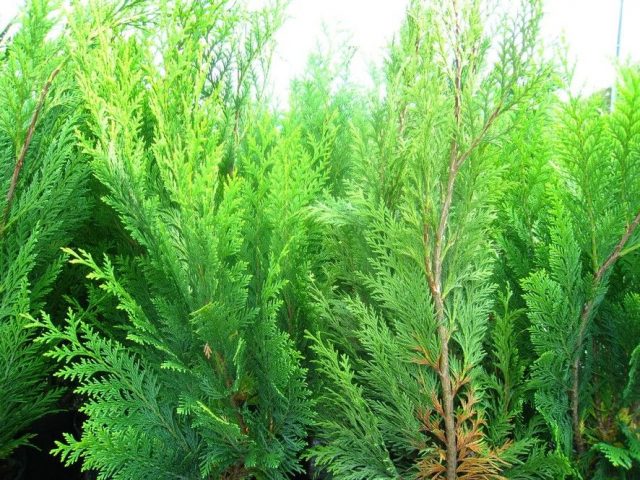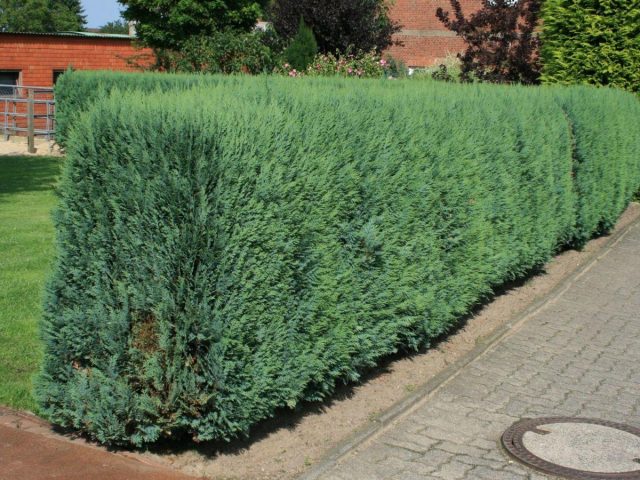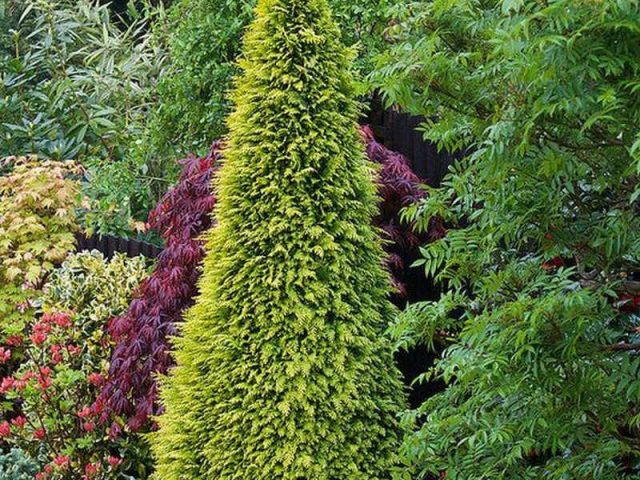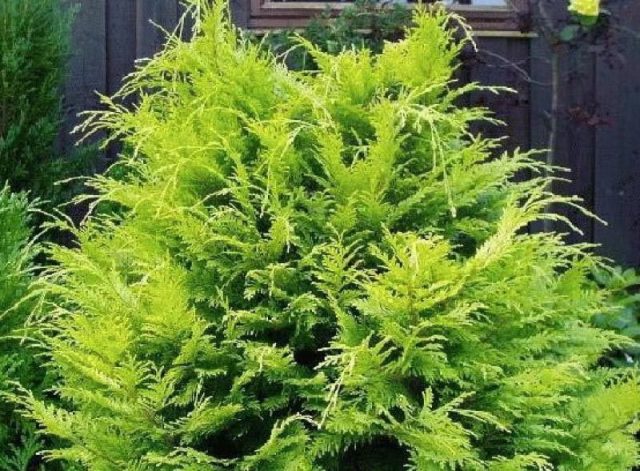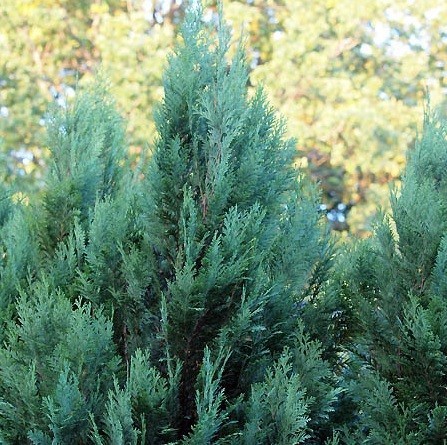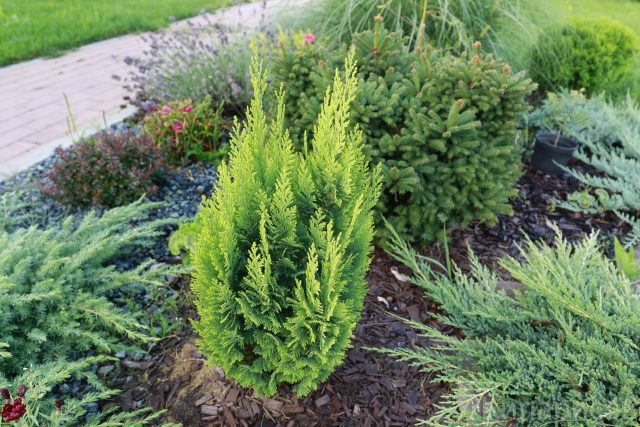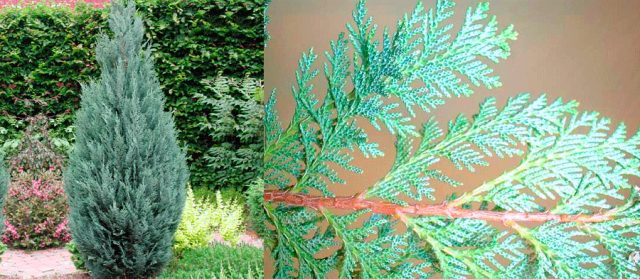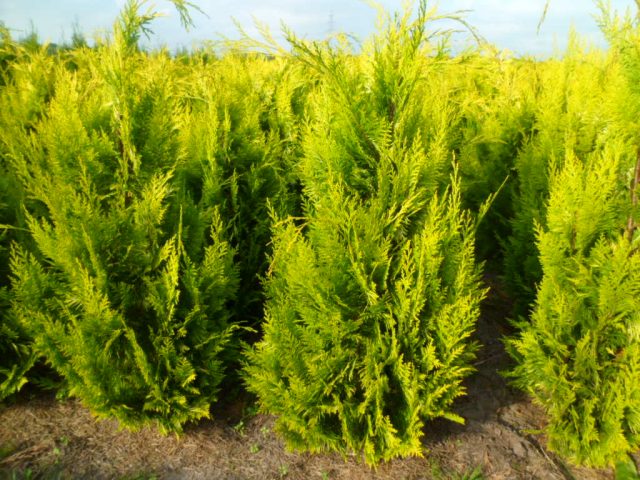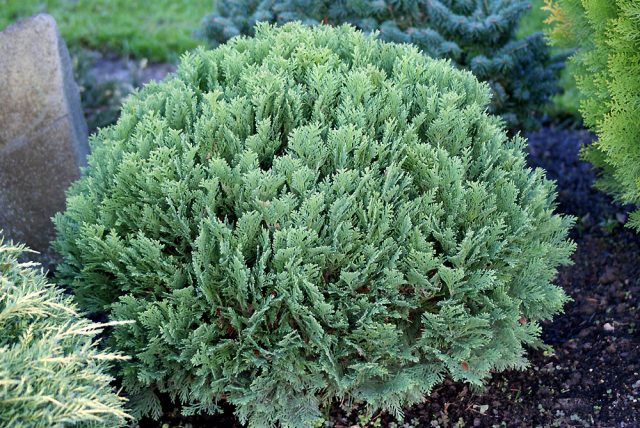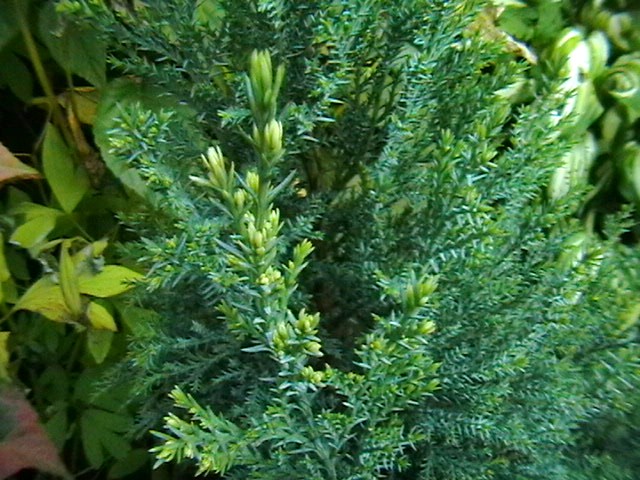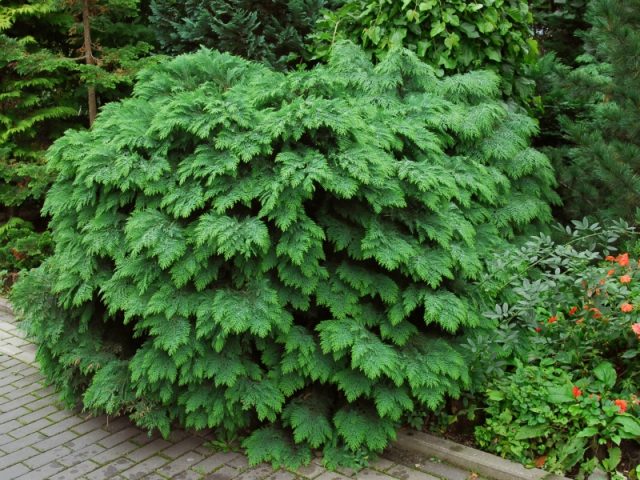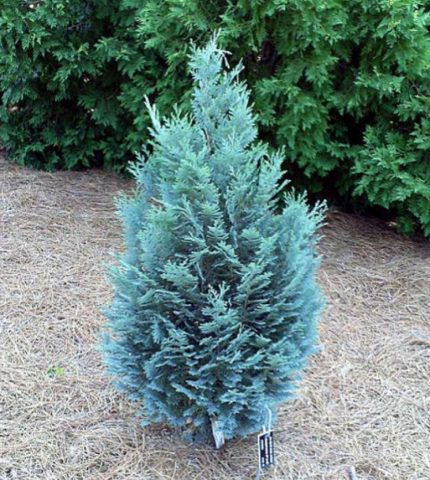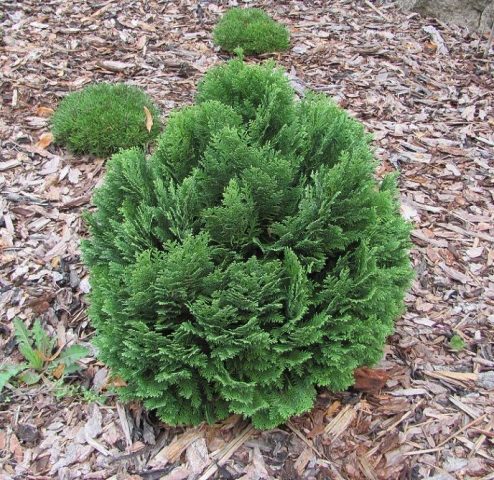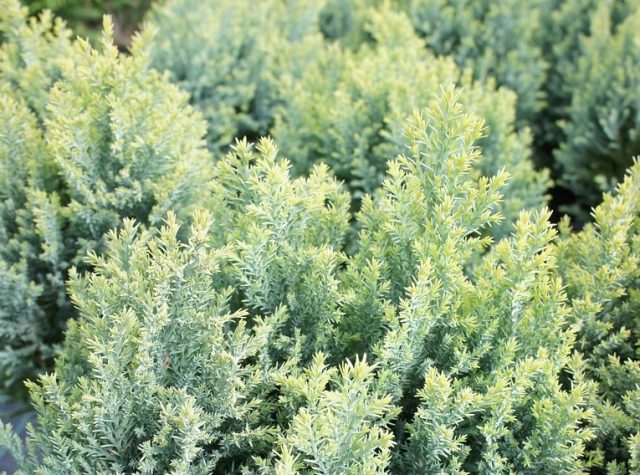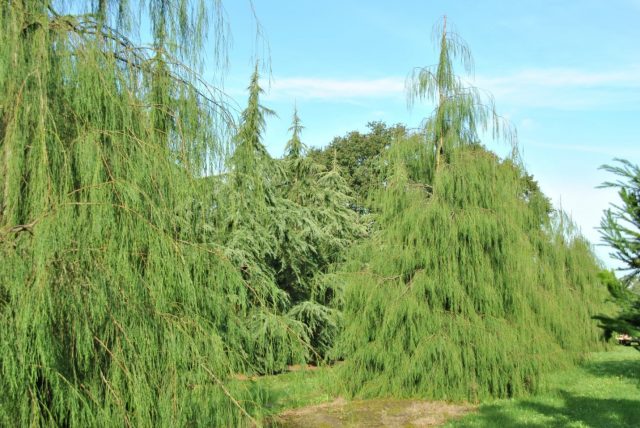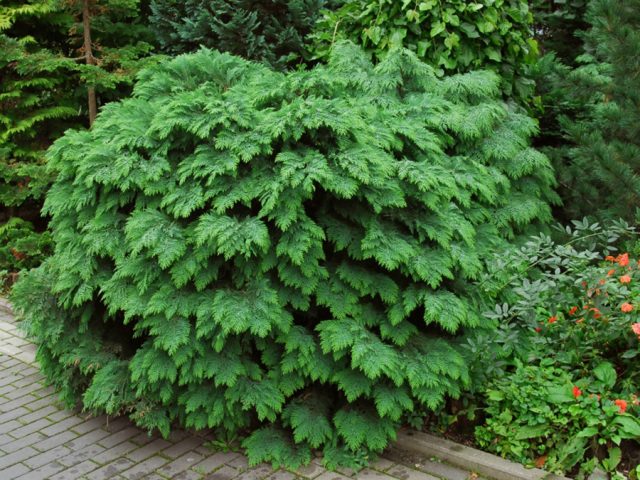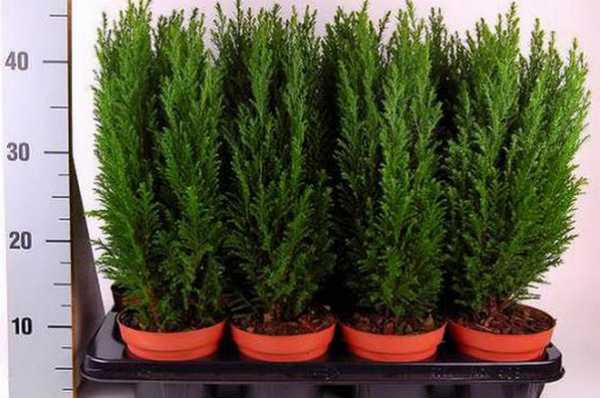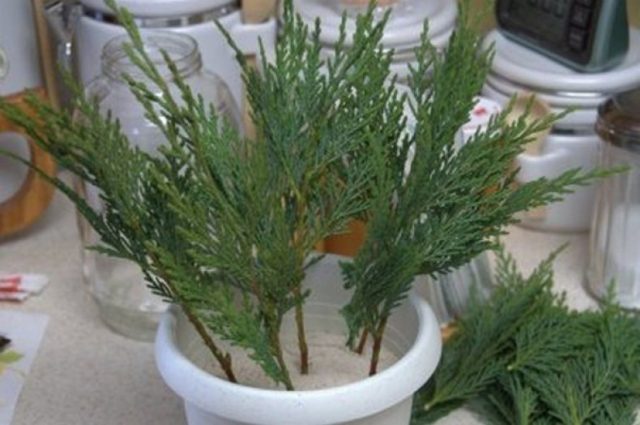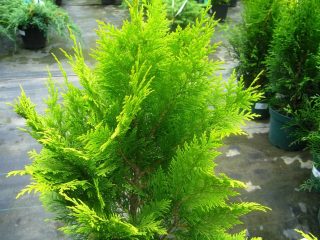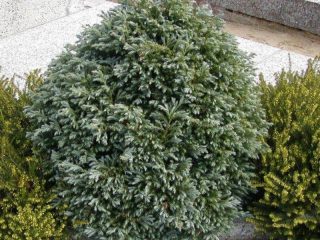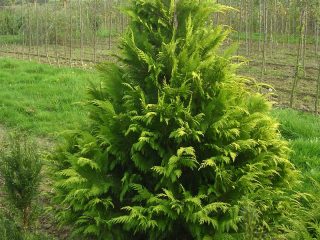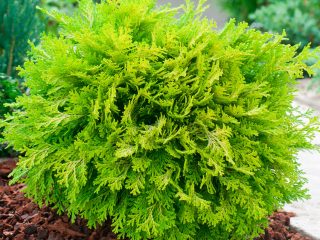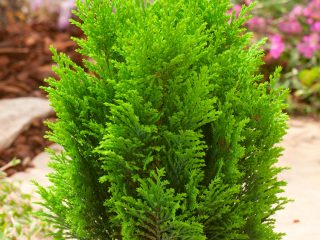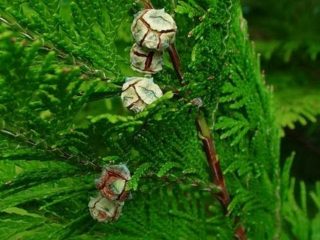Content
- 1 Description of Lawson's cypress
- 2 Lawson cypress in landscape design
- 3 Lawson cypress varieties
- 3.1 Lawson Cypress Stardust
- 3.2 Lawson Cypress Alumigold
- 3.3 Lawson Cypress Golden Wonder
- 3.4 Lawson Cypress White Spot
- 3.5 Lawson Elwoodi cypress
- 3.6 Lawson's cypress Columnaris
- 3.7 Lawson cypress Yvonne
- 3.8 Cypress Lawson Minim Glauk
- 3.9 Lawson Cypress Snow White
- 3.10 Lawson's Cypress Hanged
- 3.11 Lawson Cypress Mini Globe
- 3.12 Lawson cypress Pelts Blue
- 3.13 Lawson Globoza cypress
- 3.14 Lawson's cypress Cream Glow
- 3.15 Cypress Lawson Imbricata Pendula
- 3.16 Lawson's cypress Sunkist
- 4 Rules for planting Lawson cypress
- 5 Caring for Lawson cypress
- 6 Reproduction
- 7 Features of growing Lawson cypress in the Moscow region
- 8 Diseases of Lawson's cypress
- 9 Reviews of Lawson's cypress
- 10 Conclusion
Many lovers of ornamental plants like to plant evergreen coniferous trees on their site: thuja, cypress, fir, juniper. Such crops are an excellent backdrop for flowering plants and shrubs in the warm season, and in winter they add color to the dull black and white landscape of a snow-covered garden. One of the most beautiful coniferous trees, often used in garden architecture, is the Lawson cypress.
This species has a large number of different varieties, due to which it is widely used in landscape design.
Description of Lawson's cypress
Lawson cypress is native to California, North America. Found on mountain slopes and river valleys. The main characteristics of Lawson's cypress (Chamaecyparis lawsoniana) are given in the table.
Parameter | Meaning |
Plant type | Evergreen conifer |
Mature tree height | Up to 80 m |
Crown shape | Pyramidal, cone-shaped |
Needles | Green in color, needle-shaped in young trees, scaly in adults |
Branches | Flat |
Bark | Brown-red, sometimes dark brown, almost black |
Root system | Horizontal, superficial |
Cones | Small, spherical. As they ripen, their color changes from green to light brown with a bluish waxy coating. Each cone contains 2 seeds covered with scales. |
Lawson cypress height
The height of the Lawson cypress directly depends on the place where it grows. Under natural conditions in their homeland, in California and Oregon, trees often reach a height of 70-75 m. In our country, this plant can reach a height of no more than 20 m. A significant part of the cultivated varieties is much lower. Decorative forms of Lawson's cypress grow no more than 2-3 m.
Winter hardiness of Lawson cypress
Lawson's cypress does not tolerate cold very well, so in Russia it can only be grown in the southernmost regions. These trees are sensitive not only to the ambient temperature, but also to the climate in general. In addition, plants need good care.
Lawson cypress in landscape design
Thanks to its beautiful appearance and plastic crown shape, Lawson cypress is quite often used in landscape design.It is usually formed in the form of geometric shapes:
- cone;
- pyramids;
- spheres.
They can be used both in single plantings and in groups, for example, to decorate an alley with a row of tree columns. Lawson cypress is often used to form hedges. Dwarf varieties are great for decorating rock gardens. The pleasant green, yellow, blue and gray colors of Lawson's cypress needles are an excellent backdrop for flowering plants and bushes.
Lawson cypress varieties
Lawson's cypress (Chamaecyparis lawsoniana) has quite a few varieties. They differ from each other in size, crown shape, and needle color. The most popular varieties of Lawson cypress and their descriptions are presented below.
Lawson Cypress Stardust
Lawson's cypress Stradust (Chamaecyparislawsoniana Stardust) is a product of selection by British scientists. Released in 1900. It is a straight evergreen coniferous tree with a dense pyramidal crown. By the age of 10, its height can reach 2 m, an adult tree grows up to 8-10 m. The growth rate is 20-25 cm per year. The color of the needles is yellow-green, with a golden tint; the tips of the scales are often brown.
Planting and caring for the Lawson Stardust cypress (pictured) is simple. It can be grown in open ground in the southern regions of Russia. Frost resistance is average. Prefers acidic soils with a pH level of 5 to 7, fertile, moderately moist and well-drained. Widely used in rock gardens, mixborders, and can be grown in containers for indoor installation, on terraces, galleries, and in the halls of buildings.
Lawson Cypress Alumigold
Lawson's cypress Alumigold (Chamaecyparis lawsoniana Alumigold) is an evergreen coniferous tree, reaching a height of about 3 m by the age of 10 years. The shape of the crown is regular, cone-shaped. The branches are straight, young scales are yellowish, later turning bluish-gray.
Frost resistance is average. It can only be grown in open ground in the southern regions of Russia. Grows well in moderately moist fertile soils and loams. Can grow on calcareous soil. Does not tolerate drought well. Resistant to gas pollution, can be used for landscaping streets and industrial areas.
Lawson's cypress Alumigold is planted for decorative purposes, both in a group for decorating alleys, paths, creating hedges, and individually.
Lawson Cypress Golden Wonder
Lawson's cypress Golden Wonder (Chamaecyparis lawsoniana Golden Wonder) appeared in 1963 as a result of the work of Dutch breeders. This is an evergreen coniferous tree with a crown shape in the form of a wide cone formed by fan-shaped growing branches. The tops and ends of the shoots, as a rule, hang down. By the age of 10, the tree reaches a height of 2 m. The needles are scaly, greenish-yellow with a golden tint.
Frost resistance is weak; it can only be grown with shelter for the winter. It is undemanding in terms of soil composition, but grows better on loam or fertile soil with a sufficient level of moisture.
Lawson Cypress White Spot
Lawson's White Spot Cypress (Chamaecyparis lawsoniana White Spot) is an ornamental evergreen coniferous tree. Sometimes grown as a shrub. The shape of the crown is narrow, columnar, the branches grow straight upward. Green scales with white tips. Reaches a height of 5 to 10 m by the age of 10 years.
Frost-resistant, in the southern regions of Russia it can be grown in open ground without shelter for the winter. Grows well on fertile soils, loams, and can grow on calcareous soils with sufficient moisture levels. Does not tolerate drought well.
Lawson Elwoodi cypress
Lawson's cypress (Chamaecyparis lawsoniana Ellwoodii) was developed in 1929 in England. This is a slow-growing variety, rarely reaching 1.5 m in height by 10 years. The crown shape is columnar, in the form of a wide cone. The needles are thin, dark blue-blue or steel-blue.
Winter hardiness is quite weak; it is recommended to cover the plant for the winter, even when growing it in the southern regions of Russia. Prefers moderately moist, light soils, fertile or loamy, with a neutral or slightly acidic reaction. Can grow on alkaline soils. In landscape design it is used to design flower beds, alleys, paths, in single or group plantings, to create hedges.
Lawson's cypress Columnaris
Lawson's cypress Columnaris (Chamaecyparislawsoniana Columnaris) is an upright evergreen coniferous tree. By the age of 10 it reaches a height of 3-4 m. The crown is narrow, columnar. Formed by thin, frequent, vertically growing branches. The scales are light blue, pressed.
Frost resistance is good, one of the highest for Lawson cypress trees. In the southern regions of Russia it can be grown without shelter for the winter. It is undemanding in terms of soil composition, prefers loose fertile and loamy soils, but can also grow on calcareous soils. Requires constant soil moisture and does not tolerate drought well. In landscape design it is traditionally used for hedges, but can also be planted individually.
Lawson cypress Yvonne
Lawson's cypress Ivonne (Chamaecyparislawsoniana Ivonne) is an evergreen coniferous tree that grows up to 2.5 m by 10 years. The shape of the crown is regular, conical, the branches are straight, growing fan-shaped. The needles are scaly, golden or yellow, turning light green in the shade.
Frost resistance is quite high; in the south of Russia it can be grown without shelter for the winter. Prefers light fertile soils, moderately moist. Sensitive to overgrowth and sodding of the tree trunk circle, requires loosening. In landscape design it is usually used as a color element in collective plantings.
Cypress Lawson Minim Glauk
Lawson's Minima Glauc's cypress (Chamaecyparis lawsonianaminimaglauca) is a compact coniferous tree. By the age of 10 it reaches a height of 1.5 m. The shape of the crown is wide and round. The branches are thin and twisted. The needles are scaly, small, blue or bluish-green, matte.
Frost resistance is good, but cultivation requires a place protected from the north wind. Soils are preferably loose, fertile or loamy with a sufficient level of moisture. Does not tolerate drought. Planted individually and in groups.
Lawson Cypress Snow White
Lawson's cypress Snow White (Chamaecyparis lawsoniana Snow White), or, as it is also called, Snow White, is a low coniferous tree, more reminiscent of a shrub. Grows up to 1-1.2 m. The crown is dense, oval or broadly oval. The needles are dense, scaly, of various colors. Young needles at the ends of the shoots are bright green; closer to the middle, a bluish tint appears in color, and at the base - silver.
Winter hardiness is good, can be grown in the south of Russia, it needs shelter for the winter only in the first year after planting.It is undemanding to soil composition provided there is sufficient moisture. It is grown both in open ground and in pots and containers. Lawson's cypress Snow White is used for landscaping rock gardens, alpine slides, and Japanese-style gardens. Can be used to create hedges.
Lawson's Cypress Hanged
Lawson's cypress (Chamaecyparis lawsoniana Wisselii) was bred in Holland relatively recently, in 1983. It is a fairly tall coniferous tree with a narrow, column-shaped crown. The needles are scaly, dark green with a bluish or silver tint.
The frost resistance of the variety is sufficient to grow it in the south of Russia without shelter for the winter. Prefers neutral or slightly acidic soils with a pH level of 5-7, does not tolerate calcareous soils. Requires moderate moisture. Planted to decorate alleys, paths, and as part of compositions. Can be grown in containers.
Lawson Cypress Mini Globe
Lawson's cypress Mini Globe (Chamaecyparis lawsoniana MiniGlobus) is an evergreen coniferous tree, more reminiscent of a shrub with a spherical crown. It is classified as a dwarf plant; by the age of 10 it reaches a height of 1 m. The needles are small, scaly, green in young plants, and acquire a bluish tint in older specimens.
Frost resistance is good, but during the first years of life the seedlings must be covered for the winter. Prefers moderately moist loose fertile soils and loams with a pH level of 5-8. It will not grow on calcareous soils. Used in landscape design both in individual and group plantings.
Lawson cypress Pelts Blue
Lawson's cypress Pelt's Blue (Chamaecyparis lawsoniana Pelt's Blue) is a columnar coniferous tree.The crown shape is cone-shaped and regular. The height of the tree by the age of 10 can be 3 m. The needles are tightly pressed to the branches, bluish-steel in color.
The plant is frost-resistant enough to be grown in the southern regions without shelter for the winter. Prefers fertile and loamy soils, well moistened, with an acidity of 5-6.5. As a rule, it does not grow on calcareous soils. Can be used in landscape design as design elements for rock gardens, flower beds, and alleys.
Lawson Globoza cypress
Lawson's cypress Globosa (Chamaecyparis lawsoniana Globosa) is a low, shrub-type coniferous tree. Its height by the age of 10 can be 1 m. The shape of the crown is round. The needles are green, shiny, with white stripes.
Frost resistance is low. Without shelter for the winter it can only be grown in the south. Prefers neutral and slightly acidic soils with moderate moisture levels. Does not grow on calcareous soils. Used as an element of garden design, as part of hedges. Grows well in containers.
Lawson's cypress Cream Glow
Loveson's cypress Cream Glow (Chamaecyparis lawsoniana Cream Glow) is a fairly compact coniferous tree with a pyramidal crown shape. Its height by the age of 10 does not exceed 2 m. The branches are dense, growing upward. The needles are small, scaly, light green with a golden tint.
It has good resistance to freezing and can be grown without shelter in the southern regions. It is recommended to plant this variety on drained, moderately moist soils that have a neutral or slightly acidic reaction. Used as a separate decorative element, as well as in group plantings. Can be grown in containers.
Cypress Lawson Imbricata Pendula
Lawson's cypress Imbricata Pendula (Chamaecyparis lawsoniana Imbricata Pendula) is an original variety of evergreen coniferous tree, distinguished by its characteristic hanging “weeping” shoots. By the age of 10 it reaches a height of 2 m. The crown is loose, the needles are small, green, glossy.
Winter hardiness is average; in the first years after planting, it is recommended to cover the seedlings for the winter, even in the southern regions. Grows well in fertile, moist soils with a pH level of 5-6.5. Can be used for both individual and group plantings.
Lawson's cypress Sunkist
Lawson's Sunkist cypress (Chamaecyparis lawsoniana Sunkist) is a small shrub-type coniferous tree. Reaches a height of 1.5-1.8 m. The crown is wide, conical or hemispherical. The needles are dense, dark green, acquiring a golden hue closer to the periphery.
Winter hardiness is good; as a rule, only young shoots freeze slightly. It is recommended to grow in moderately moist, neutral and slightly acidic soils. Can grow on calcareous soils. Tolerates drought well. Planted to decorate rock gardens, Japanese gardens, and the banks of ponds.
Rules for planting Lawson cypress
All varieties of Lawson cypress are demanding on lighting. Therefore, they should be planted in an open place with sufficient sunlight. For some species, light partial shade is allowed. In addition, most varieties of this tree prefer the following conditions for normal growth:
- Moderately humid climate.
- Neutral or slightly acidic fertile soil or loam.
- Lack of cold northern winds and drafts.
The pits for spring planting of Lawson cypress are prepared in advance, in the fall, taking into account the size of the root system of the future seedling.As a rule, a depth of 0.9 m and a diameter of 0.7 m is sufficient. A layer of drainage - broken bricks, large crushed stones or stones - must be laid on the bottom. The holes are left in this form until spring.
In spring, seedlings begin to prepare for planting. The containers are spilled with water in advance to make it easier to remove the cypress tree along with a lump of earth. The plants are carefully removed and placed in planting holes so that the root collar is 10 cm above ground level. The voids are carefully filled with soil and compacted. Planting is completed by abundant watering with dissolved fertilizer (300 g of nitroammophoska per 10 liters of water). After this, the tree trunk circles are mulched with tree bark, pine needles or peat.
Caring for Lawson cypress
Lawson's cypress is very sensitive to the condition of the tree trunk; it should not be allowed to turn into turf. Therefore, it needs to be periodically weeded, loosened and mulched. Watering is important. The average water consumption per tree is 10 liters per week. Moreover, the cypress tree must not only be watered at the root, but also its crown must be sprayed.
Lawson's cypress growing on fertile soil, as a rule, does not need fertilizing. If the soil is depleted, in spring and summer you can fertilize using a liquid solution of complex mineral fertilizers or a special composition for conifers.
Twice a year, in early spring and autumn, it is necessary to carry out sanitary pruning, removing branches that have frozen over the winter, broken, damaged and dry branches. Starting from the 2nd year, trees can be shaped in a certain way for a more decorative appearance of the crown. This procedure is not mandatory.
Reproduction
Lawson cypress can be propagated by seed or vegetative methods. The first one is used quite rarely due to the fact that it is long. In addition, when propagated by seeds, only species characteristics are preserved, while varietal characteristics can be lost.
To avoid this, vegetative propagation methods are used, namely:
- cuttings;
- layering.
Cuttings are harvested in spring or early summer. They are cut from young shoots 15-18 cm long. The needles are removed from their lower part and planted in a container filled with a mixture of wet sand and peat. The container is covered with film, creating a greenhouse microclimate. Under such conditions, the cuttings take root in 1-1.5 months, after which they are planted in large containers for growing.
Layerings can only be obtained from varieties with creeping shoots. One of the side branches is bent to the ground, the cambium is cut at the point of contact with the soil, then the branch is fixed with a wire clamp and covered with soil. This area is regularly moistened. From the cut, its own root system will begin to develop. In the first year, the cuttings must overwinter together with the mother plant, and in the spring they are separated and the young shoot is planted in a new place.
Features of growing Lawson cypress in the Moscow region
The climate of the Moscow region is not suitable for growing Lawson cypress in open ground. Most lovers of ornamental plants plant these trees in flowerpots or special containers, putting them outside for the summer and putting them indoors for the winter. Compact varieties can be grown on the balcony, not forgetting the need to ensure temperature conditions and maintain a high level of humidity.
Diseases of Lawson's cypress
Lawson's cypress gets sick relatively rarely.Most often this is due to disruption of care. Overwatering or stagnation of water in the roots can cause root rot. At the initial stage, you can cure the plant by removing the damaged roots and treating the remaining part with fungicides. If the disease has spread to the above-ground part, the plant will no longer be able to be saved.
Reviews of Lawson's cypress
Conclusion
Lawson's cypress is a very beautiful decorative coniferous tree. It has many varieties, different in needle color, size and shape, so any lover of ornamental plants can easily choose the right one. This plant requires good care, and not in all regions it can be planted in open ground. However, the presence of dwarf forms allows you to have it even at home and grow it in almost any region.
